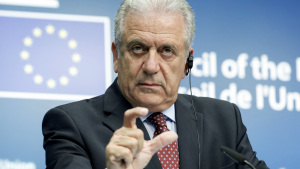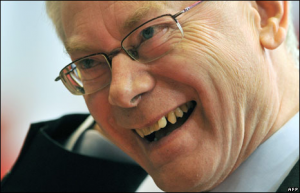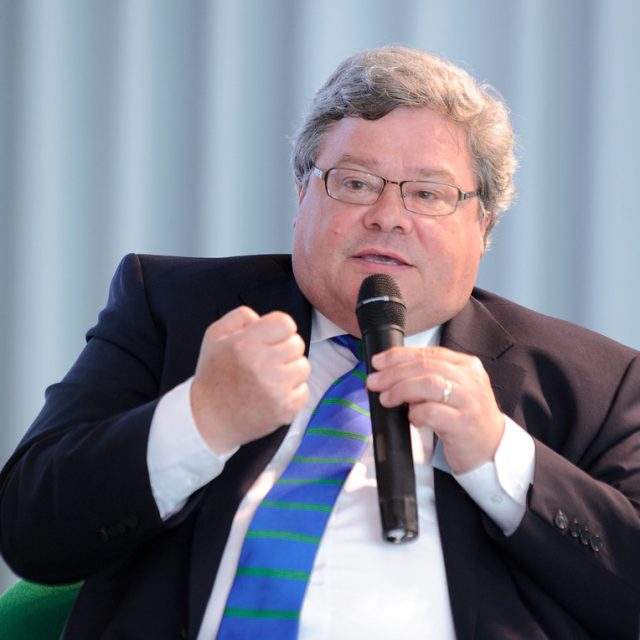Several speakers also pointed out that it should serve to remind the world that the threat comes not just from jihadist groups but extremists from the Far Right.
The conference was timely, not just as it came in the wake of the tragic loss of lives in New Zealand but it also marked the third anniversary of the Brussels terrorist attacks, in March 2016.
It also came just ahead of expected adoption on 21 March by the European Parliament of a new legislative proposal that would oblige internet providers to remove terrorist content or disable access to it within 60 minutes after receiving an order from authorities.

One of the keynote speakers, Dimitris Avramopoulos, EU Commissioner for Migration, Home Affairs and Citizenship, who told the packed audience the events in New Zealand had caused the “same sense of profound shock” as those in Brussels three years ago.
As was shown by the latest atrocity, radicalisation processes are “driven and fuelled by an ideology” which is used to justifiy using any means – including violence – against the public.
Jihadism is clearly not the only lethal threat Europe is facing – there is also a growing and direct threat from extremists from the Far Right.
He said that when he took over his current dossier in 2014 “nothing could have prepared me” for what was to follow soon after and that the subsequent terrorist attacks around the world had served as a “lesson” that a new approach to tackling the issue was urgently needed.
The official outlined some of the steps which have since been taken, including curbing terrorist financing, new laws on illegally-held firearms and better information sharing, some of which he describes as “game changers.”
Avramopoulos cited the EU’s “internet forum”, under which it cooperates with tech giants like Facebook and Twitter to remove terrorist content from the internet.
His message, though, was that such efforts were far from complete and, as such the EU had tabled a regulation which,if enacted, will see such material removed from online platforms far more quickly than is the case now.
Efforts are also needed to work more closely with all actors involved, including prisons,currently a “hotbed” for radicalisation. Returning foreign fighters from conflict zones like Syria and Iraq is another particular problem although sensitivity was also needed when dealing with women and children with links to such people.
The terrorist threat still needs to be confronted “head on”, he noted, adding, “As we saw in New Zealand, the extreme Far Right and Islamic terrorism has the same outcome – innocent lives are at threat.”

Another speaker was Roberta Bonazzi, president of the European Foundation for Democracy, a Brussels-based policy institute which, along with the European Policy Centre, organised the half-day conference which brought together high-level EU decision-makers and government representatives, frontline practitioners from the police, prison service and local authorities, and civil society organisations.
She said, “One of the main drivers of radicalisation processes leading to violent extremism and the commission of terrorist acts is ideology. As we have seen repeatedly, radical ideologies – whether right-wing, left-wing, Islamist or other – play the key role in brainwashing individuals, encouraging them to commit acts of violence. We have been saying it for more than a decade; European and other governments need to devote significantly more resources to radicalisation prevention efforts, and empower more vetted civil society groups to engage in this work so that we can lessen – indeed our goal should be to eliminate – the pernicious role that ideology plays in destroying lives.”
Bonazzi encouraged governments across Europe to adopt more robust vetting systems to ensure they are not inadvertently supporting ideology-driven groups with public funds. Empowering the right partners is paramount, she argued, particularly from civil society groups “who have on the ground experience, expertise and knowledge to advise governments on which groups are the most appropriate to work with – and those to steer clear from.
She said, “Possessing the correct tools to address different radicalisation contexts and scenarios is crucial for effective prevention activities. Practical tools, including radicalisation detection and prevention guides for teachers and other front-line professionals, have a critical role to play in identifying the signs of radicalisation and provide recommendations for further professional support to be sought by the families and friends of those affected. Such tools can help to make vulnerable communities more resilient in the face of efforts by extremists to radicalise individuals and recruit them to violent extremism. I would encourage governments to support those organisations that are developing these guides and tools, which can be adapted to the different geographical regions of Europe.”

In an opening session, Koen Geens, Belgium’s Minister of Justice of Belgium, said that five years after the terrorist attack on a Jewish Museum in Brussels and the twin attacks on the city’s airport and Metro in 2016, radicalisation leading to violent extremism and terrorism continues to pose “serious challenges.
Geens pointed to a set of legislative and non-legislative anti-terror measures taken over the last five years,including a “change of culture” which means the various Belgian agencies now wore “more fluidly” together. “Instead of keeping important information to themselves, they are sharing it,” he told the audience.
The Flemish politician cited a recently introduced database which, he suggested, had proved a “key tool” in the fight against terror and violent radicalisation.
However, he added a note of warning in the use of such technology, adding, “We must make sure we closely monitor its use and ensure we do not stigmatise anyone.”
Anyone working in the field of prevention of radicalisation and extremism must be mindful, he said, to the risk of stigmatising individuals and groups that can occur when certain communities are explicitly associated with extremism and terrorism.
As with other speakers, he addressed the issue of online hate speech and the spread of extremist messaging via social media, saying this was “feeding a polarisation” in society.
Despite efforts to address this, it continues to be a major problem as was evidenced in the Christchurch attacks which, the event heard, had been livestreamed. Facebook was forced to remove 1.5 million copies of the footage within 24 hours.
The new draft law proposed by the EU would require companies like Facebook to remove such material within one hour of them receiving a so-called “removal order.”
Geens, whose mandate will end soon, outlined measures adopted to strengthen the resilience of countries, cities and local communities against the threat of radicalisation that can lead to terrorism. He suggested the time may be ripe for binding rules to combat the spread of such online content.

Former European council president Herman van Rompuy warned that populists and nationalists are particularly keen to gain advantage of the current climate which made working closely with civil society all the more important.
Such groups had to be involved in the process of implementing effective prevention programmes. One example he cited was the work done in this area by the mayors of Vilvoorde and Mechelen in Belgium after the Brussels attacks. It emerged after the atrocity that some had lived in two Brussels communes.
But the former Belgian PM cautioned that “there is no silver bullet against radicalisation and terrorism,” adding that the response “needs to come from all levels, national and local.”
He said, “The root causes of radicalisation that can lead to terrorism are still there and that is why we need to invest in poor neighbourhoods and work with people like teachers and others at the grassroots level such as youth workers who work with minors. Early detection is key so all have a crucial role to play in making vulnerable communities more resilient. Radicalisation in prisons is still also a problem in many member states.”
His message, echoed by many others at the conference, was: “Islamic State may have lost ground militarily and that is a turning point but that is only half the battle.”




